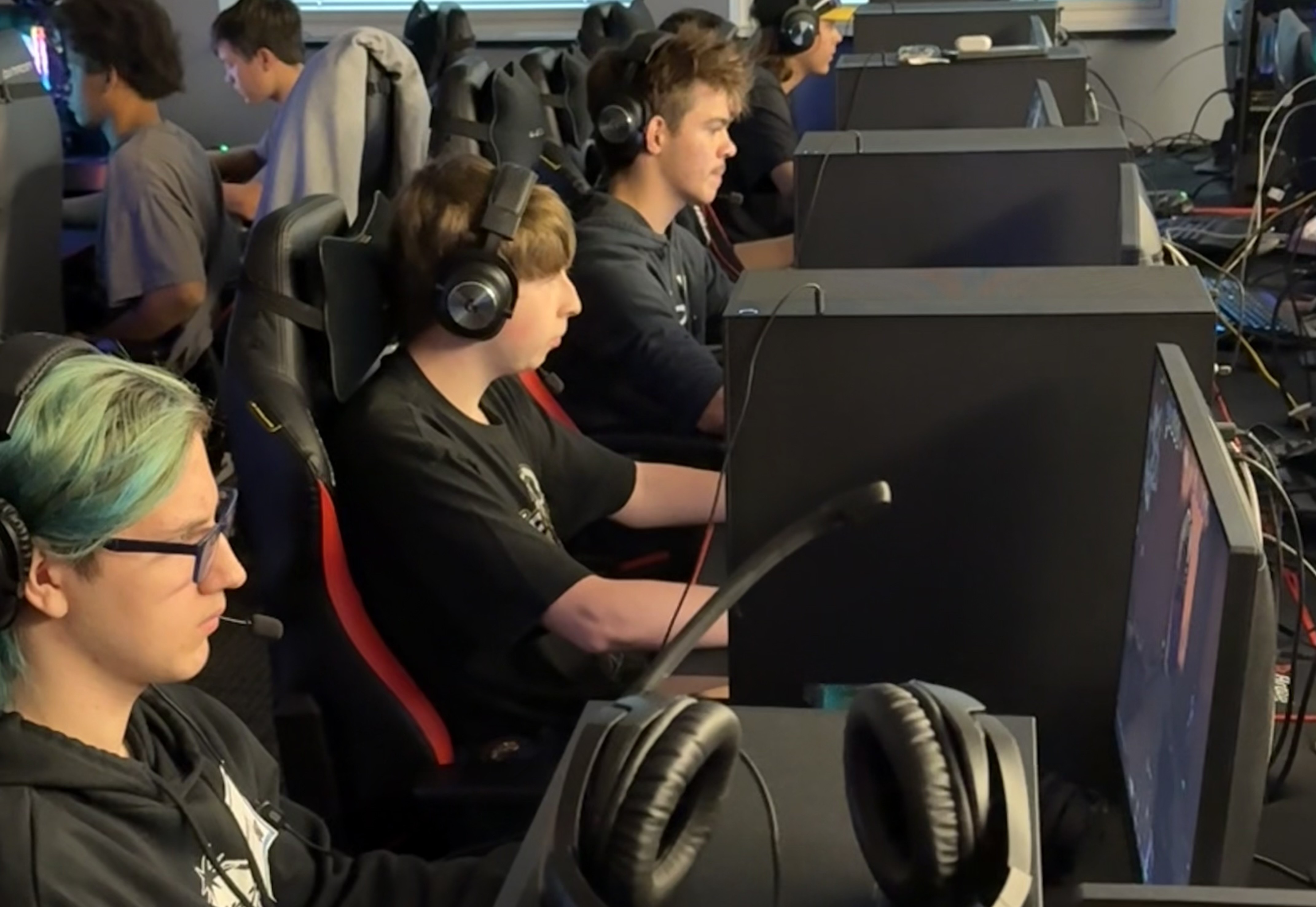Making Professional Development Matter with #Edcamp Model
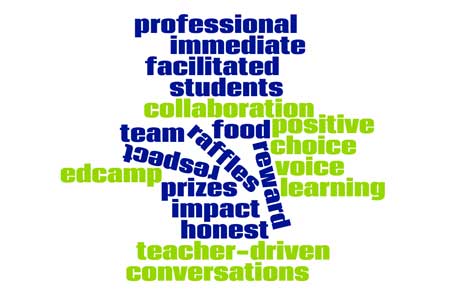
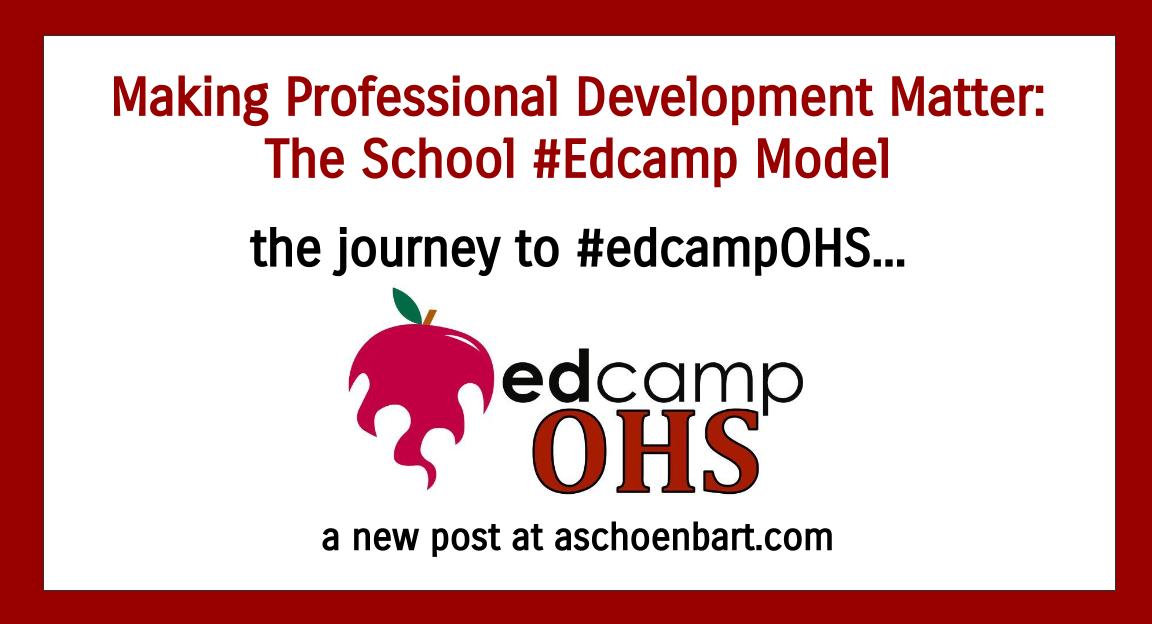
The first ever #EdcampOHS is on this Wednesday.
In this post, I’m going to reflect on the journey to get to this point in an effort to shift culture and make professional development more meaningful. I’ve written about the #edcamp model and my experiences before, but this one’s different because we’ve adapted the edcamp and unconference model to our school building and staff. Following the lead of many great districts, we’ve designed a day of professional learning and conversation that honors the unconference model and meets the needs of our staff and administration for this first experience.
For more of my writing on edcamps, be sure to check out “This is the Most Exciting Time!” Reflecting on #EdCampNJ & #NYSCATE15, My Big #edcamp Weekend: From #edcampMville to #edcampHV, or Crowdsourcing #Edcamp Advice.
The Journey
As a coach, I’ve spent a lot of time this year thinking about the professional development opportunities offered in my school, and in most schools. And too often, the best opportunities are those that are “opt in”: classes, conferences, after school trainings, connected experiences, and the like.
Another problem is that we often ignore the things that good educators know in planning professional development. If we know that people learn better when they are engaged, can collaborate, have choice, and can understand the “why” of the learning, why are we ignoring the principles of best teaching and learning in most professional development?
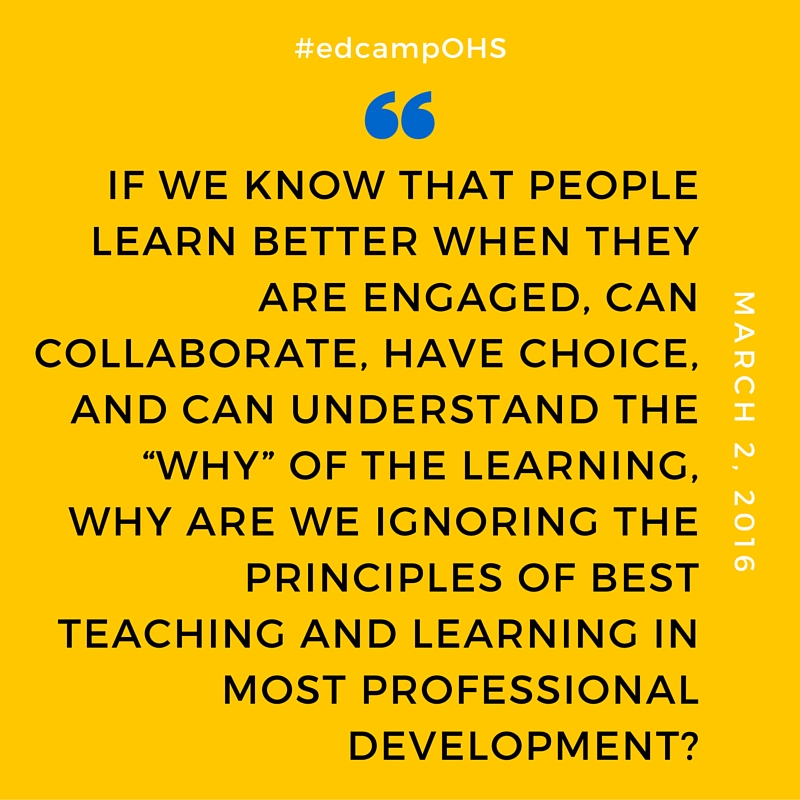
In my district, we’ve made efforts to shift this paradigm by offering choice and inviting ideas from both teachers and administrators to help guide the work that goes into PD offerings. Still, a lot of it happens during drop in hours and by appointment, and more of it really isn’t as open to choice as we may think. I’ve learned this year that no matter how hard you work, it isn’t easy to balance schedules, plan for variety, and meet every departments’ needs.
Tools and ideas to transform education. Sign up below.
In many ways, #EdcampOHS was my plan to change all of that. I proposed the plan to a colleague back in the fall, and my principal and administration jumped on board. Still, when the thought of a professional day is often met with dread and memories of being talked at, jampacked schedules, and leaving feeling more exhausted than teaching days, there was a lot of work to do.
The Goals
Change is hard, and it takes time. With that in mind, I wanted to be sure to give everyone a clear goal and rationale for the day and how it was run. #EdcampOHS is intended to be a day of teacher-driven professional conversation and learning, where every educator’s time is valued through choice, food, and rewards. Simply put, we do great things in my school and impact the lives and learning of so many; this deserves recognition. Teachers need and deserve an opportunity for honest and meaningful discussions about teaching and learning about the things that matter to them. With this choice, voice, and agency, we can take the ideas and learning to make an immediate impact on our students tomorrow.
#EdcampOHS and all professional learning should be a filled with:
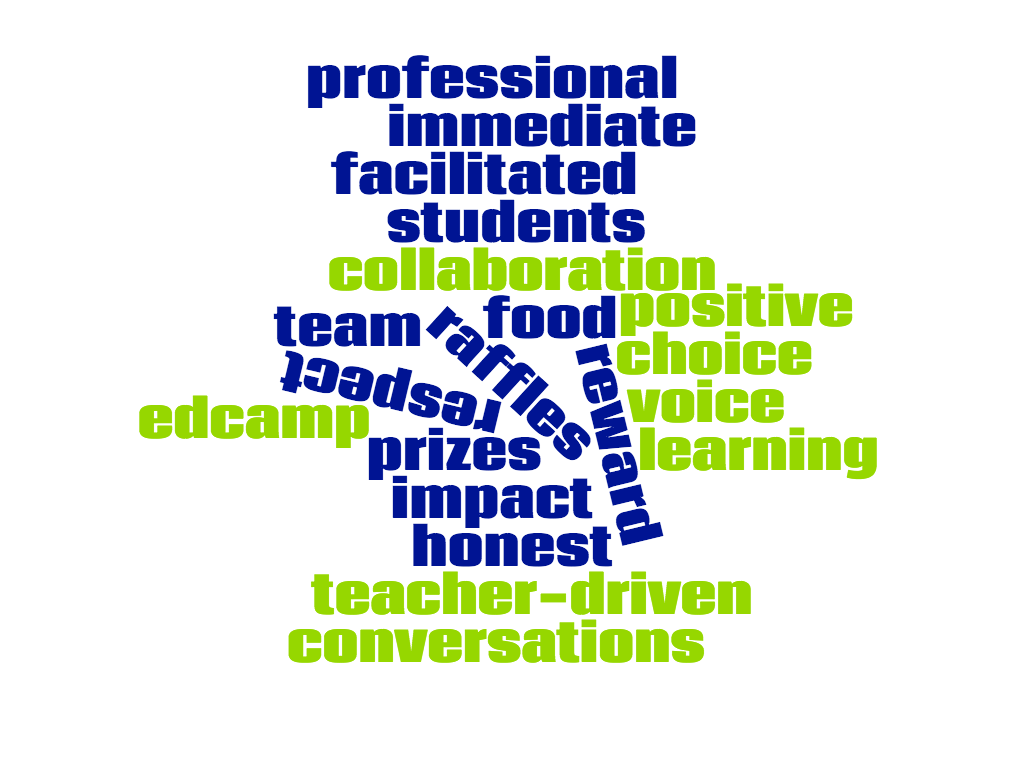
The Plan
To start, I needed a team. Once the day was approved, I worked with the other building coaches to build a team. We wanted educators from all departments who could provide a voice for their departments’ needs and interests. I wanted a real collaboration to build something together and to add checks and balances to my English and tech-focused mind.
We decided that while many sessions would involve technology, they needed to be about more than that. This included best teaching practices, problem-solving, and strategies to help specific groups of students. No session should consist only of an expert presentation; instead, we wanted facilitated conversations.
Next, we put out a call for help from the entire faculty. We knew some compromises needed to be made from the full edcamp model our first time around, but here were the absolutes:
- Completechoice: there are no restrictions on any sessions because of job title, subject area, or topic
- The Rule of Two Feet: if you are not learning or contributing where you are, find somewhere else you can
- Food: a full educator is a happy one--we needed breakfast, coffee, and snacks all day
- Prizes: let’s reward our awesome with both the typical #edcamp and #edtech sponsors but also local ones from the school community
- Sharing: our learning needs to be documented and shared to promote and celebrate the awesome, including on Twitter, collaborative notes, and more
With these core guidelines, we had our plan. We found great sponsors in the #edtech world and our community, including local restaurants, the PTSA, and more.
The Compromise
Thinking about the possibility of #edcampOHS, and how far we’ve come makes me proud and excited. Still, we knew that the full unconference model wasn’t a realistic one for the first attempt at anything close to an edcamp. If we did not plan any sessions or topics, it puts a lot of pressure on participants who were not yet familiar with this system, not to mention would have made most administrations nervous. Still, we wanted to provide opportunities to build capacity for teacher leadership while building towards these goals.
Instead, we tried to capture the essence of the model with some careful planning. We solicited topics from the faculty as a whole and through department representatives on our committee. Then we tried to flesh them out with titles and one-sentence descriptions, with the goal of then connecting the premise with an educator. If we knew what people wanted to learn or talk about and could find passionate educators to facilitate the session, we could match passion, choice, and learning.
In the end, we had 20 sessions with over 25 facilitators from across every subject area in the school. With three sessions, this means that all participants could choose from 6-7 different topics and could also use the collaborative notes and social media to learn and review anywhere and anytime.
And in two days, we will see how it goes.
Next Time with #EdcampOHS
This post was cathartic. I thought that by reflecting on the journey in preparation for the big day, I could share some insight with others on bringing the #edcamp model to a school event while reminding myself of how far we’ve come. And I think I’ve succeeded.
Stay tuned next week and I’ll tell you how it went. Or even better, follow me on Twitter @MrSchoenbart this week to see it live. Share your experiences with the edcamp movement and changing PD on Twitter or in the comments below.
Learn more about #edcampOHS at tinyurl.com/edcampOHS
cross posted at www.aschoenbart.com
Adam Schoenbart is a high school English teacher, Google Education Trainer, and EdD candidate in Educational Leadership. He teaches grades 10-12 in a 1:1 Chromebook classroom at Ossining High School in Westchester County, NY and received the 2014 LHRIC Teacher Pioneer Award for innovative uses of technology that change teaching and learning. Read more at The SchoenBlog and connect on Twitter @MrSchoenbart.
